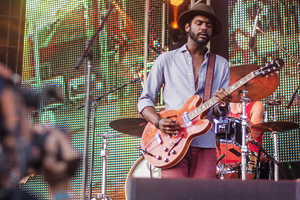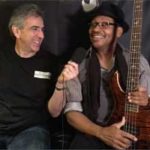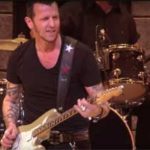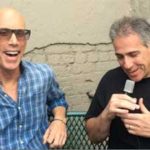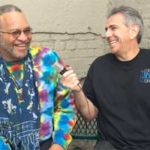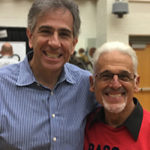Texas native opens up about R&B heroes, remaking “Come Together” and what he learned from Eric Clapton
By Gary Graff
November 10, 2017
There’s certainly no shortage of great guitar players to come out of Texas — in general, and especially from the Austin area. Gary Clark Jr. is among the latter; he’s been releasing albums since 2004 but really caught the international spotlight eight years later, when he signed with Warner Bros. Records and released the acclaimed Blak And Blu. The key to Clark’s success is both virtuosity and variety; he’s the product of a wide array of influences — including rock, R&B, funk, jazz, country and hip-hop in addition to blues — that all surface in his music, and he’s as accomplished as a songwriter as he is as a player. A church and high school choir veteran, Clark picked up guitar as an adolescent and was mentored by the late Austin promoter and club owner Clifford Antone. He became a fixture on the Sixth Street scene (and beyond) — in 2001 he was feted with a Gary Clark Jr. Day in Austin — and by 2010 he made enough of an impact to be booked at Eric Clapton’s third Crossroads Guitar Festival as well as the following year’s Bonnaroo Music Festival, and was tapped by Sheryl Crow and Alicia Keys to guest on their albums. It’s been a bit of a hard-fought trip, but Clark — currently riding high with a remake of the Beatles’ “Come Together” for the Justice League film — is better for the battle…
FGPO Where does that variety and diversity in your music come from?
Clark: Y’know, I’ve been associated with the blues thing, being the guitar guy, and that is a major part of what I do. But I was influenced by and love all sorts of music, so I write like that and record like that and experiment with all kinds of sounds. And for my first major label album, I just want to put it all out there rather than just playing straight-ahead blues or just stick to one genre and then bring the weird stuff out later. I thought I might as well introduce myself as a weirdo first and get it out of the way and see what happens.
FGPO: Does the breadth reflect your upbringing? Did you grow up in a musical household?
Clark: I did. My grandmother had a piano at her house and my aunts and uncles were always playing and singing. My parents played around with music and singers and had a wide variety of records — funk, soul, rock ‘n’ roll, jazz. I had an older sister, four years older than me; I really looked up to her and she’d bring home the hottest albums of the time by R&B groups or rock ‘n’ roll bands. I kind of soaked up that just be being in the next room and hearing her blasting it loud and pissing me off [laughs]. So there was that, and then being with my friends and listening to all kinds of stuff — hip-hop, R&B. So I was around [music] a lot, a lot, a lot. I was in choir at school. I wanted to be in the jazz band, but they already had a drummer. Anything that made noise, I gravitated towards.
FGPO: How did you decide music was “it” for you?
Clark: I think I was five when I first started being really conscious of and aware of what swirled around me. But what clinched it was I was a huge Michael Jackson fan when I was a young, young kid — I still am. My folks surprised me and my sister and my cousins, and we went to see him in concert in 1988, on the Bad tour. I just remember him coming on stage and the energy, and the crowd was just going crazy. I remember thinking after that that I would love to do that, and it was always on my mind after that. That was a big moment, but I was always kind of shy about expressing I wanted to be a musician. All the other kids would say they wanted to be a doctor or a lawyer, but I wanted to be on stage.
FGPO: What got you over the hump?
Clark: I guess the seventh grade talent show. I was in this group with my buddy, Robbie, and we had this song called “Young Soul” — that was the name of our group, too. We were 11-, 12-year-old kids; it was just me and him. And we sang this thing a capella at the talent show. I remember I was really nervous, but after it was done I was like: “Wow, that felt great,” just the energy of expressing yourself and getting some love back kinda changed it for me. Instead of being so freaked out about it, I got a little bit more comfortable.
FGPO: And you started playing…
Clark: I decided on guitar the next year. My friend played in that talent show, too; she had a band and they played a rock ‘n’ roll tune. I thought it was cool. They had live instruments — guitar, bass, drums — like a loud trio. She had a black Stratocaster and a Fender Twin, and I said: “This chick is awesome! I want to play guitar, too.” It just so happened she lived down the street from me, so we’d hang out and listen to rock ‘n’ roll and blues and stuff. Then we started going to blues jams when we were 14, 15 — that was her idea. I don’t know if I would’ve gotten into the whole blues scene if she wasn’t like: “Hey, want to go play in this blues jam on Sunday?”
FGPO: Being in the city you were had to have an impact as well.
Clark: Oh, yeah, sure. When I first started playing guitar and running around in Austin, around Sixth Street — that’s the main hot spot for live music in town — I was soaking up all kinds of things. I was a teenager, so it was a very influential period. But my mom said something to me; she told me that “even when you’re with all those people running around crazy downtown, keep a place for Jesus. Keep playing in church. Keep playing gospel music, too. I listened to her —most of the time [laughs]. That was great advice.
FGPO: Do you have a natural inclination towards any one of the styles you play in? Like you said, the blues is your root. Is it challenging to go in the other directions?
Clark: Actually, that stuff, for me, is a lot easier. That’s the kind of stuff I was influenced by. I was into Curtis Mayfield stuff, Otis Redding, Motown and Stax type of albums and then Prince, Ready For The World, stuff like that was what I was playing when I was a kid. So those melodies, those sounds, were in everything I was listening to. I started diving into the blues when I got to be about 12, and I was already writing — well, not really writing at that age. I didn’t know what it was called, making noise, maybe. But the R&B and soul stuff kinda came first, so I don’t really think of it as one thing being easier or harder to approach than the other. It’s all part of my musical influence, a natural progression. I soaked everything up naturally.
FGPO: You’ve hung with some heady guitar-playing company over the years. What’s the best lesson you’ve received?
Clark: We did shows with Eric Clapton in the [Madison Square] Garden last year, and he had me sit in with him and the first thing he says to me was like: “Man, you’re like the king of reverb,” and it was obvious it wasn’t a compliment. So it got me thinking about that. That’s all I’ve been thinking about is, “There’s too much reverb,” so thanks, Clapton.
FGPO: Do you think people understand that there’s more to you than just the gunslinger?
Clark: Oh, no, not yet, and that’s fine. I plan on being here for a long time, and you don’t play all your cards up front. Of course, I would love to be noticed for different things that I do; I’m not just a one-trick pony. But that’s fine. I’m grateful. I got more than I ever dreamed and things are happening great for me, so I’m not questioning anything. I’m flowing and it feels good right now. The people who are rockin’ with me get what I’m doing, and I appreciate that and love that.
FGPO: The “Come Together” remake is going great guns. How did that come about?
Clark: Basically I was sitting around and got a phone call that said: “This ‘Justice League’ thing is happening. Don’t tell anyone about it. We want you to be part of this music.” It had [producer] Junkie XL, who’s awesome, by the way, and I guess he had me in mind. They had “Come Together” in mind as an idea, and I guess he really cut it for me to be part of it.
FGPO: It’s a pretty iconic song. How did you approach it?
Clark: I showed up at the studio in L.A. and we sat down and got the vibe and he played me the track, and I was blown away — just by the sounds the guy came up with. And he says: “You know that buzzy guitar thing that you do? Just do that and sing the hell out of it,” so that’s what I did. It just so happened that was a kind of comfort zone —loud fuzzy guitars over, like, futuristic rock ‘n’ roll, industrial sound. I love that vibe, so the only option was to play loud and hard, and that’s just kinda what I did.
FGPO: Are you into the superhero world? Does it mean something extra to be part of this?
Clark: Oh, yeah, I’m into all that. I think that’s why my knees are so bad; I used to cut up my dad’s old silk robe and tried to turn it into a Batman cape and jump off the roof of my house thinking I was Batman, and that didn’t work really well. But I’ve been a fan of all this for a long time, so it’s really cool to be part of it. And my kid is super into Batman, so I’ve been showing him photos of the posters and stuff. It’s pretty exciting.
FGPO: Where are you at on a next album?
Clark: I’m working on my next project, next record. I’m just really in that mode. I’ve been working on it on and off. I used to never be able to work on the road, but I just kind of figured out how to put ideas down and make it work and find that time for myself on the road to shut it down and be creative. Now I’m back in Austin organizing that stuff and it’s just flowing. I’ve got time so I’m not putting any rules or any regulations or restrictions on this. I’m just riding the creative wave, and so far it’s been good.
